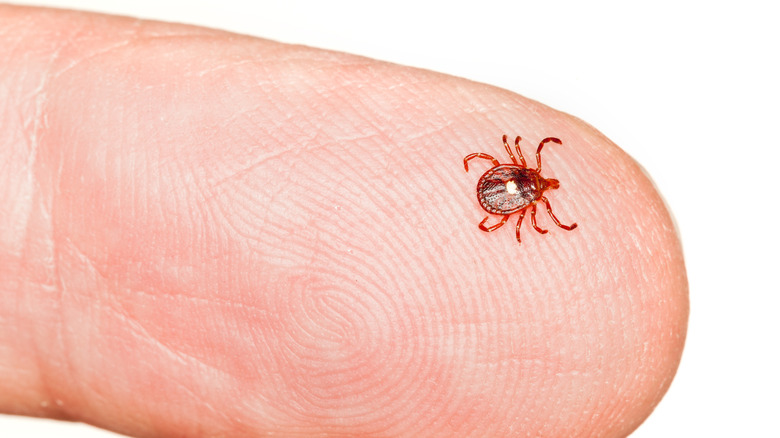People Bit By This Tick Species Are Developing An Allergy To Meat
Ticks being vessels for diseases and viruses that can spread to humans isn't a new development, and as weather patterns continue to shift, the likelihood of encountering the little blood-sucking parasites increases across the US. This could result in more cases of Lyme disease, Rocky Mountain spotted fever, and several other illnesses, plus there's also the threat of developing meat allergies.
Alpha-gal Syndrome (AGS) is still being studied, but its primary symptoms include a variety of adverse reactions to meat (beef, pork, rabbit, etc.), milk and milk products, and even some foods that simply contain meat elements (gelatin, marshmallows, gummy bears, and so on), according to the CDC. More specifically, AGS causes humans to develop an allergic reaction to the sugar molecule galactose-α-1,3-galactose, which is often found in mammals.
Once infected, it's common to experience symptoms like itchiness, nausea, difficulty breathing, swelling, stomach pain, dizziness, and more after eating red meat or products that contain the Alpha-gal molecule — or, in some severe cases, from simply smelling these products. The CDC believes that most cases of AGS are the result of a bite from the Lone Star Tick, which is predominantly found in the southeastern U.S., though it has slowly spread along the east coast and parts of the central U.S. over the past several years. It's also theorized that AGS can be transmitted via other species of tick, but that hasn't been confirmed yet. Ultimately, the point is to watch out for ticks.
Do I have Alpha-gal Syndrome?
If you begin to feel nauseous, itchy, or notice other adverse effects after eating red meat (or items that contain red meat byproducts), you might have AGS. According to the CDC, symptoms usually begin around two to six hours after exposure to products that contain Alpha-gal, but not everyone will experience symptoms every time.
It's recommended that you consult a medical professional if you believe you may have AGS, as they can run tests to look for antibodies in your system that would indicate infection. Be prepared for a physical exam, blood tests, and possibly an allergy skin test. With that said, there is a possibility that these tests may not confirm AGS right away, or it could turn out that you don't have AGS at all.
In the event that you do have AGS, you should speak with your healthcare provider or an allergist to determine what food products to avoid. This list can vary from person to person as not everyone will have a reaction to the same products, though. Unfortunately, there isn't currently a cure for AGS, so your only option is to stay away from foods that will set off any symptoms.
How can I avoid contracting Alpha-gal Syndrome?
Preventing AGS is both simple and difficult, especially if you or your pets spend a lot of time outdoors. Primarily, you just need to not get bitten by a tick that's carrying the disease, something the CDC details on its website. Where things get complicated is the constant need for vigilance, as even something as mundane as an untucked shirt can give ticks an opportunity to bite.
Before going outside, it's recommended that you tuck all of your clothing into each other: tuck your shirt into your pants (including overshirts), and tuck your pants into your socks. Consider using EPA-recommended repellents or permethrin, or putting on pre-treated clothing (via EPA). If possible, you should also try to avoid walking through bushy, grassy, or wooded areas where ticks are likely to be waiting for animals to brush against the branches or leaves they're waiting on.
When you come back inside, look over your clothing for ticks that may have hitched a ride, then immediately hop in the shower and thoroughly check yourself for any ticks, unexpected bumps, moles, or even tiny dark spots (deer ticks are sometimes small enough to look like a speck of dirt at first glance). If you do find any ticks, remove them right away, the CDC says. Also, be sure to avoid trying to squish any ticks you may find, especially not with your bare hands, as they're very sturdy and could end up biting your finger.


